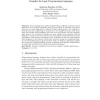Free Online Productivity Tools
i2Speak
i2Symbol
i2OCR
iTex2Img
iWeb2Print
iWeb2Shot
i2Type
iPdf2Split
iPdf2Merge
i2Bopomofo
i2Arabic
i2Style
i2Image
i2PDF
iLatex2Rtf
Sci2ools
192
Voted
JUCS
2006
2006
The Design of the YAP Compiler: An Optimizing Compiler for Logic Programming Languages
: Several techniques for implementing Prolog in a efficient manner have been devised since the original interpreter, many of them aimed at achieving more speed. There are two main approaches to efficient Prolog implementation: (1) compilers to bytecode and then interpreting it (emulators) or (2) compilers to native code. Emulators have smaller load/compilation time and are a good solution for their simplicity when speed is not a priority. Compilers are more complex than emulators, and the difference is much more acute if some form of code analysis is performed as part of the compilation, which impacts development time. Generation of low level code promises faster programs at the expense of using more resources during the compilation phase. In our work besides using an mixed execution mode, we design an optimizing compiler that using type feedback profiling, dynamic compilation and dynamic deoptimization for improving the performance of logic programming languages. Key Words: Dynamic co...
Related Content
| Added | 13 Dec 2010 |
| Updated | 13 Dec 2010 |
| Type | Journal |
| Year | 2006 |
| Where | JUCS |
| Authors | Anderson Faustino da Silva, Vítor Santos Costa |
Comments (0)

